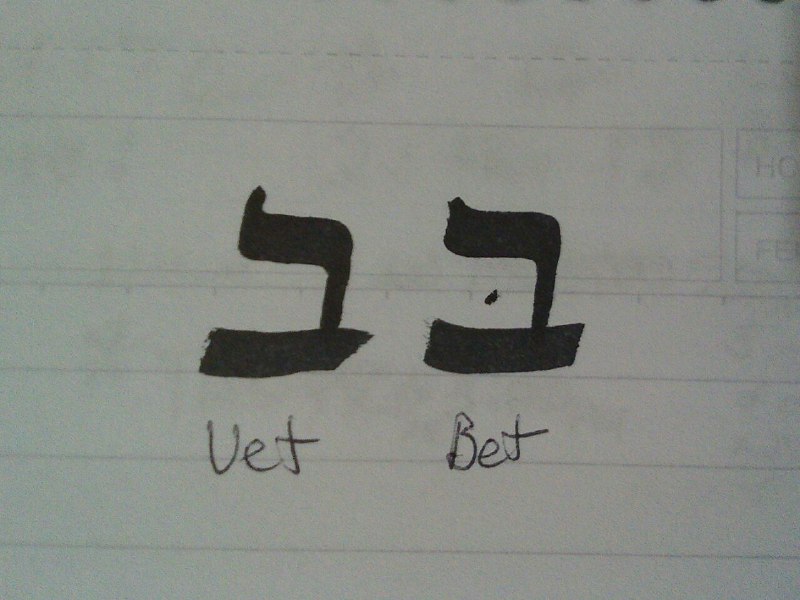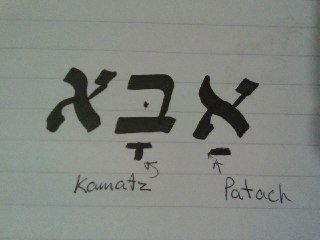The ancient language of ibrit - Bet and Vet
Like the Alfabet, The letters in Hebrew are called the Alef - Beyt They are presented on my blog from bottom to the top so you can learn them order, then to read them right to left. You will see what the original "Bible" said and what the names meant as they went through the stories of old.
Here is Bet: Symbolizing a house
It's the second letter. It is a consonant . It is also the number 2
- The sound is that of a B or a V depending on the point in the middle.

The original way of writing this letter was like a squared spiral - as it were. Like the entrance to a tent.
First word "Abba" which means Father.

Vowels are markings that appear below, and sometimes above or within the letters. Vowel pointings as they are called, can define the sound of a vowel or they are the sound after a consonant.
- The first vowel above is a Patach (the name of the vowel) and the alef has no sound but the ah made by the Patach.
- The second vowel is a Kamatz which is a longer aah - adding to the sound of the beyt, Top to bottom, it is bah
- The final alef on the left has no sound.
I hope to add meaning to these little lessons each Shabbath as we go. Then we can read together with the vowel points in place and see how it all jives with English.
Thanks for taking the time to read.
Steemit teacher eh? Good work! Thanks for the support! I'm putting you on my auto voter. Hope we continue helping each other!
Your are nice. You're right. I upvoted, and followed you. :)
Thanks. You'll get a nice chunk of curation from this one, too! ;)
Excellent... he is a very good teacher.
Nice project, on teaching hebrew :)
Thanks to put it this simple and easy to understand for everybody.
So next time we will learn about Gimel?
No spoilers... tisk tisk... :)
I'm interested in learning hebrew. No more spoilers :D
When I'm in the office the colleague next to me is from Israel, well Minsk via Tel-Aviv, but has an Israeli passport and did the army for Israel. He tries to explain me some of the signs, but he does not well as you do. He tells me, ohh vowels, this is complicated as I don't have the pointings on my keyboard :)
On the 5-7 September the Israeli Olympic Memorial will be inaugurated in Munich by the two presidents. I hope it will be writen also in hebrew.
I study hebrew in order to read the Bible in it's original form, culture, idiomatic ideologies, and thought. I got tired of people arguing which English version is best, worst, accurate, etc. There were 4 different religions in my family and holidays were only opportunities for arguments.
I read the 4 versions they used. I didn't see all the points they fussed about. Some but not all. Now I just want to know the complete culture, meodim that are still remembered.
Regarding vowels. They are not used in modern conversation or writings. You are just supposed to know which word it is by context. Know the pronunciation by context. They could be added for clarification today I suppose.
Last example: you would know which one of these to use depending on context in English:
Sight site and cite
I get you, more then you can ever imagine. I come from a multireligious family, with 5 Christian branches. We had Bibles in house in several languages as my family is mixed. I come from Transilvania which was part of the Austrian Empire before, now Romania and the population was so mixed and so were the religions.
You might see it this way, the English versions are translations and adaptations from other languages, not directly from hebrew. The first translation came from the latin and the second from german with the protestant movement. None of them is the best or the worst and the most accurate.
This is why I started learning latin, as it was the first translation from hebrew, but appeared a couple of centuries later and also this got divided into two versions by the great schysm between the western and eastern church, which was solely power motivated as the Western Roman Empire got weaker.
The oldest versions that still use some different language is the Egyptian/Ethiopean Orthodox. They are the oldest Christians, this is why they guard the last stations from the Way of the Cross in Jerusalem, before you get to the tomb where all churces are present.
Have you been to Jerusalem? I did 5 years ago a trip to Israel and was impressed by it. I promised myself I have to go again with more knowledge and more documentation.
Thanks for the clarification with vowels :)
I have not been to Israel, would love to go. I had looked at Latin along the way, but that was before I was actually bilingual. Now that I know what it means to think in another language, I know that thinking in biblical Hebrew is the only way to understand why there are so many religions.
I don't believe there are many, if any, contradictions in the Tanakh (old testament) or even any when combining the Brit Hadashah (renewed covenant) with the Tanakh.
I take the final warning very seriously. The one about adding to and taking away from what is written. Now tri-lingual, though still learning vocabulary, I will try and include the answers to questions that are never given by a native (never had to learn it) Hebrew teacher. I won't have all the answers either, but I am a teacher, having taught English and Spanish for over 15 years.
Thanks for adding to the thread. And thanks for the first vote ever from RandoWhale!
Hebrew shall be the way to see the bible. Also the Tanakh is in both old hebrew and aramaic, there might be some,contradictions, but knowing how the jewish people threat literaly everything is writen, the chances are slighty lower.
In the Bible there are a lot of additions, like the most famous one is and it was added a couple of centuries later: let him who is without sin cast the first stone, from the book of John (my favourite of the books by the way). A hebrew native teacher will bring you a lot of value. Also some old rabbi can help, as they study from they youth years the old books.
Spanish has also some interesting versions. Especially with versions translated from hebrew, german, french and latin.
I have to thank for the amount of upvotes, so the randowhale is the least I can do. I send rando 3-5 times a day and some other of the bots to posts that I like, as my voting power is still low. It is a small project I do, to give back to the community. It is also a motivation for the writers to get past the shallownes that stigmatises the society. Every comment I leave is from a post I've read in detail, searching for that special piece of knowledge.
Love the thread, so I'm happy if I can bring some value to it.
Excellent - I came to the same conclusion.... The Bible (Torah) will only make sense in Hebrew + Aramaic for Daniel and a few other books
unfortunately am pretty late on this one
post again and thank you!
Hello its me infinity, nice post.Upvoted and followed. We are new here. Hope you will visit our blog.If you like our concept please upvote.We want to share our knowledge to whole world.
This is amazing! I've been wanting to learn the basics of Hebrew since January, unfortunately there is no course to learn it anywhere near where I live, and I distrust most of the "online courses" where you have to pay for a whole year before you even had time to see for yourself if it's worth the investment or not.. So this is kinda perfect :) thank you so much kind sir. Just started following and I'll be sure to upvote and study all of your posts! God bless
Yes i also :) i have app but this post are nice with photos for illustration
is it the same language Jesus used?
No, he was speaking Aramaic, a jewish dialect.
thank you for the info., some in Old Testament written in Aramaic.
Yes, the Tanakh which was the base for the Christian Old Testament contains parts in Aramaic but it is mainly in hebrew writen.
Well there are over 70 interpretation in English. They all agree that right here Jesus spoke to a Jew in Hebrew
Act 26:13 At midday, O king, I saw in the way a light from heaven, brighter than the sun, shining round about me and those who journeyed with me.
Act 26:14 And when we were all fallen to the ground, ..I heard a voice speaking to me, in the Hebrew tongue saying, Saul, Saul, why do you persecute me?
Act 26:15 And I said, Who are you, Lord? And he said, I am Jesus whom you persecute. It is hard for you to fight against the goads.
Act 26:16 But get up, and stand upon thy feet: for I have appeared to you for this purpose, to make you a minister and a witness both of these things which you have seen, and of those things which I will show you;
True, is Aramaic not a dialect of Hebrew? Jesus main language was Aramaic but he spoke also Hebrew like you pointed out as hebrew was the liturgical language used in temples.
Love this thread!
Upvoted and also resteemed!
thank you for sharing this :)
This post has received a 17.83 % upvote from @booster thanks to: @htooms.
One of my first interactions - thanks @htooms
Those were dangerous days.
Hi @hebrew Interesting post and unique in Steemit Community... Thank you!
A good post @hebrew..
this will be the first stage of learning about the Ibrani, if you are willing to make more detailed postings, maybe there will be many people who feel helped by you.
such posts are rarely encountered.